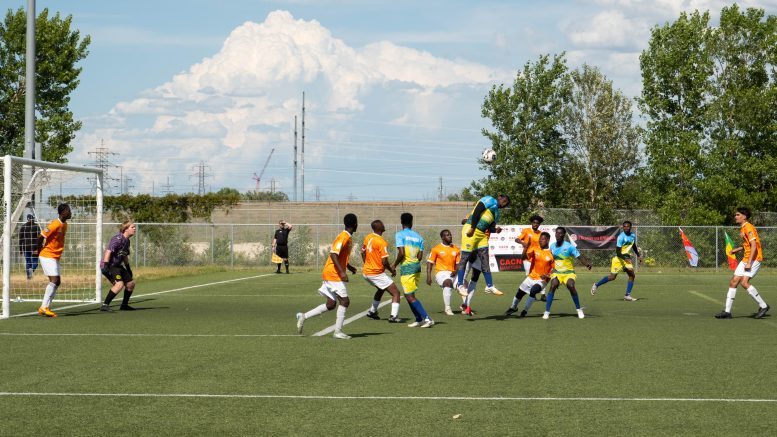The Manitoba African Cup of Nations returns to unite various countries in friendly competition.
Seidu Mohammed, the co-founder and operations manager of the annual soccer tournament has shared the inspiration behind organizing the competition and the community it fosters. He encouraged other countries to partake in the tournament.
“Manitoba African Cup of Nations is about the community,” said Mohammed. “In the history of Manitoba, there is this kind of tournament that goes on before, but it wasn’t organized or wasn’t kept well. We have to bring it back. This tournament started in 2019 with four teams: Ghana, Eritrea, DRC, Congo, and Senegal. Those are the teams that we started this tournament with. And the reason we brought this tournament is about the unity. We want to unite the African communities.
“Through African communities, we can get all the African communities come together so that we can have a common goal,” he explained.
“And, in Africa, we love soccer, and soccer is a universal language for everybody. That’s why my president and I wanted to bring this tournament out so that the African communities can come out, have a common goal [and] at the same time, learn about each other’s culture. It’s more about the African communities.”
Mohammed added that their motivation as planners come from their desire to give back to the community. “What motivates us is about the refugees and immigrants that come here in Canada. And when we go there, we got a lot of help from communities. They help us, they give us resources. It’s like paying back to the community. Where they help us, we also want to make sure we give it back to our community. That’s what kept us going, that’s what kept us moving.”
He included, “there’s a lot of immigrants and refugees who are participating in this tournament, students and all that. It’s part of the motivation that we had to organize this tournament.”
Mohammed confirmed that the tournament has seen growth in the number of teams participating each year.
“It has been [expanded] each year.” He added, “in 2020, we got eight teams, and the eight teams are Senegal, Ghana, DRC (Congo), Nigeria, South Sudan, and Eritrea. And there’s two teams that came and joined […] since then, it’s been expanding every year. So that each year that we go, it’s more exposure. It’s exposed everybody, and everybody come here and watch […] In 2021, we got 12 teams […] 2022, we got 12 teams, and 2023, we got 16 teams. 2024, we got 16 teams, and this year, we got 12 teams.” He discussed the efforts involved in organizing the tournament and the challenges that come with it.
“[It’s] very challenging, because one, we have to book the field six months ahead, because without a field, we cannot get everything organized. The field alone is a lot of time to put in. And also, to organize and call, send emails, call the teams, and make sure everybody is registered, it’s also challenging. It’s not an easy thing for us. And we always make sure we want to keep everything organized […] because we have our guidelines, we have our rules, we want everybody to follow the rules. If you don’t follow the rules, you are not allowed to play. It’s very difficult from day one to this day.”
Mohammed talked about how the future looks for the tournament.
“The future is bright […] the teams are very passionate, they are very proud of their country and their community here in Manitoba.” He said, “we are happy to always have this tournament going. We never want it to stop, because it’s something that we want [for] the community, we want to make it more inclusive, not exclusive.” Mohammed said there have been guest teams since last year, “Ukraine are here this year, and Haiti also are here. We want to make it more [inclusive] for other communities to join, so that we can all learn the culture that we have.”
He encouraged more countries to join the tournament, reiterating the goal of commitment to diversity and inclusion.
“We hope to have a lot of teams that come on, because we know there’s some communities who don’t have bigger communities here like Nigeria and DR Congo. And now you see Ghana, they are getting more population here in Manitoba. We want to make [the competition] more diverse. A country or a community that doesn’t have enough players, they can get some people to come in, which also makes them know the culture of these communities.
“We want to make sure we get all the communities involved, because without them, we couldn’t have gone this far. They have supported us since day one, and we are [grateful].”
In this year’s tournament group stage, Group A features Ivory Coast, Kenya, Rwanda, and South Africa. Group B includes Ghana, Haiti, Ukraine, and Senegal, while Group C is made up of DR Congo, Eritrea, Cameroon, and Tanzania.
Upcoming group stage games are taking place on July 5 and 6 at Shaughnessy Park Turf Field, starting at 4:30 p.m.

